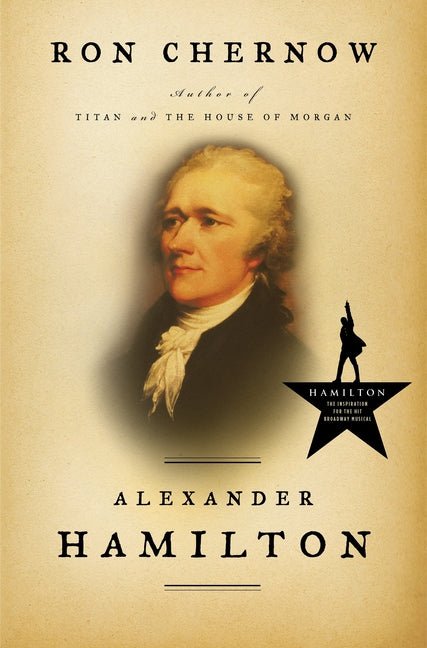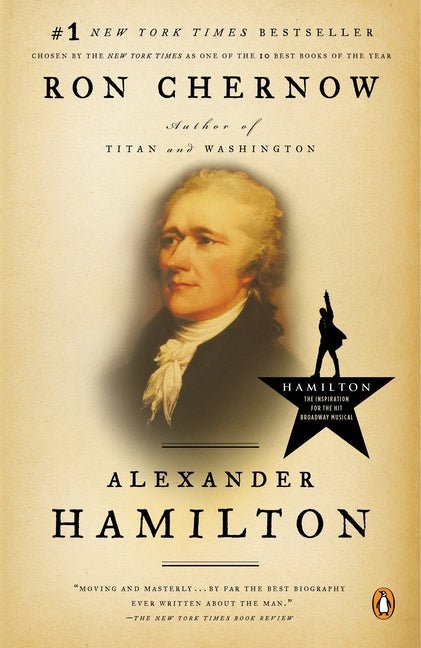Alexander Hamilton
by Ron Chernow
*When you open this audiobook on Libro.fm, be sure to select Aveson as your bookstore so that your purchase supports local literacy programs and tree‑planting.
Couldn't load pickup availability
The #1 New York Times bestseller, and the inspiration for the hit Broadway musical Hamilton!
Pulitzer Prize-winning author Ron Chernow presents a landmark biography of Alexander Hamilton, the Founding Father who galvanized, inspired, scandalized, and shaped the newborn nation.
"Grand-scale biography at its best--thorough, insightful, consistently fair, and superbly written . . . A genuinely great book." --David McCullough
"A robust full-length portrait, in my view the best ever written, of the most brilliant, charismatic and dangerous founder of them all." --Joseph Ellis
Few figures in American history have been more hotly debated or more grossly misunderstood than Alexander Hamilton. Chernow's biography gives Hamilton his due and sets the record straight, deftly illustrating that the political and economic greatness of today's America is the result of Hamilton's countless sacrifices to champion ideas that were often wildly disputed during his time. "To repudiate his legacy," Chernow writes, "is, in many ways, to repudiate the modern world." Chernow here recounts Hamilton's turbulent life: an illegitimate, largely self-taught orphan from the Caribbean, he came out of nowhere to take America by storm, rising to become George Washington's aide-de-camp in the Continental Army, coauthoring The Federalist Papers, founding the Bank of New York, leading the Federalist Party, and becoming the first Treasury Secretary of the United States. Historians have long told the story of America's birth as the triumph of Jefferson's democratic ideals over the aristocratic intentions of Hamilton. Chernow presents an entirely different man, whose legendary ambitions were motivated not merely by self-interest but by passionate patriotism and a stubborn will to build the foundations of American prosperity and power. His is a Hamilton far more human than we've encountered before--from his shame about his birth to his fiery aspirations, from his intimate relationships with childhood friends to his titanic feuds with Jefferson, Madison, Adams, Monroe, and Burr, and from his highly public affair with Maria Reynolds to his loving marriage to his loyal wife Eliza. And never before has there been a more vivid account of Hamilton's famous and mysterious death in a duel with Aaron Burr in July of 1804.
Chernow's biography is not just a portrait of Hamilton, but the story of America's birth seen through its most central figure. At a critical time to look back to our roots, Alexander Hamilton will remind readers of the purpose of our institutions and our heritage as Americans.
Share
Book Details
ISBN:
9781594200090
EAN:
9781594200090
Binding:
Hardcover
Pages:
832
Authors:
Ron Chernow
Publisher:
Penguin Press


Historians become historians, in some cases, because they're more comfortable with documents and numbers than with people. When they turn to biography, they sometimes carve shortcuts through modern psychology that even Dr. Phil would find shallow.For instance, writing of Hamilton's wife, Chernow says, "Eliza was either pregnant or consumed with child rearing throughout their marriage, which may have encouraged Hamilton's womanizing."Eight children in 20 years was typical of a late 18th century family (and of an Amish one in more recent times); if it "encouraged" Hamilton's womanizing, it ought to have encouraged a general orgy of colonial bed-hopping. Yet a great many men who had large families did not philander. So we're back to where we began, except for an acquired mistrust of Chernow's easy assumptions and apologetics.Chernow's summation of Hamilton's attitude toward slavery suffers from the same superficiality. "The early exposure to the humanity of the slaves may have made a lasting impression on Hamilton," Chernow writes, "who would be conspicuous among the founding fathers for his fierce abolitionism."The final word there ought to run up a red flag. "Abolitionist" wasn't even used in the anti-slavery sense until the 1830s, a generation after Hamilton was dead (in his lifetime it refered only to the slave trade). Yet Chernow uses it repeatedly.According to this view, Hamilton saw slavery first-hand in the Caribbean where he grew up and where his family owned slaves, and this instilled in him a horror of human bondage. Yet Madison and Jefferson, too, as Chernow writes, grew up "against an incongruous background of black hands stooping in the fields." And they are counted among Hamilton's opponents on the issue of slavery. So, once again, the image is insufficient to explain the story.Yet Hamilton's "abolitionism" is a central theme in the book. "It is hard to grasp Hamilton's later politics," Chernow writes, without contemplating the "raw cruelty" of slavery he witnessed as a boy. The strain here is as obvious as the bid to contain the man in a word that didn't exist in his time.Hamilton was a voluminous, and often embarrassingly confessional, writer. Some 22,000 pages of his works have been published so far; a pile that daunts even a dedicated historian like Chernow, who writes at one point that Hamilton "must have produced the maximum number of words that a human being can scratch out in forty-nine years."You'd think, then, that Chernow would be embarrassed by the fact that Hamilton never makes the connection that Chernow takes as a central tenet: he make no reference to any impact of exposure to West Indian slavery on his later political positions.The current generation of academic U.S. historians, raised in the Sixties, have busily been rubbishing Southerners generally, slave-owners especially and Thomas Jefferson particularly. It seems they've found themselves with a national narrative wanting a hero.Hamilton, like many founders, had scruples about slavery. Unlike most of them, he avoided being personally involved in it, either through financing slave-trading voyages or owning slaves himself. Thus the rehabilitation of Alexander Hamilton. Old CW: Hamilton=silk-stocking snob and closet royalist. New CW: Hamilton=The One Who Didn't Have Slaves.Jefferson is the arch-villain in any Hamilton story, but in this one the third president is never allowed to stray far from the image of his "stooping" slaves, the better to dismiss, without argument, Jefferson's populism and democratic liberalism. Chernow actually blasts Jefferson for spending his own money on books in Paris -- books carefully selected and which he would later donate to the nation as the Library of Congress -- because it "betrayed a cavalier disregard" for the slaves whose labor supported him.Anyone who knows the Hamilton story knows right where to turn at this point to see whether Chernow is making a serious case that Hamilton was a man of honor while Jefferson and Madison were racist brutes, or whether he's blowing smoke.Hamilton's 1791 "Report on Manufactures" is one of the most important documents in early U.S. history. In it, the Treasury Secretary outlines and explains in detail America's future as a great manufacturing nation. Along the way, he praises the British factory system - specifically for its employment of women and young children. "It is worthy of particular remark that, in general women and children are rendered more useful, and the latter more early useful, by manufacturing establishments than they would otherwise be."Just after praising Hamilton for using the word "diversity," which will "please modern ears," Chernow faces the unpleasant task of explaining this passage. Hamilton notes approvingly that in British textile mills, the women and children form more than half the work force, "of whom the greatest proportion are children and many of them of a very tender age."Yet Chernow will overlook all this, and continue hi...
Wonderful biography and history of the early years of our nation. Read this after seeing Hamilton on Broadway. The musical was very true to the book.Alexander Hamilton’s intellect and energy was essential to the founding and initial success of the American experiment. His importance and contribution was equal to that of Washington and Jefferson. His wife Eliza was the unsung heroine of the story and is given apt recognition by the author.
After seeing the.musical, Hamilton (on Disney) I felt compelled.to read this. It took over a year but so worth it!
Over 35 hours for the audiobook was hard to get through in a 21 day borrow from the library but well worth it. The narrator was easy to listen to. The book was very interesting. I am not a political person so some parts drug a little but those were few and far between.Alexander Hamilton was so prolific in his shortened lifetime it is amazing. Eliza, his widow was just as amazing with her orphanage work and her dedication to her husband’s memory even with his flaws. Her confrontation with President Monroe in her 70s was well deserved and I wanted to clap for her. As my husband said, I agree that our founding fathers were not as noble as we portray them to be. I was pretty shocked at the propaganda in our country’s early years. I agree with another historian that AH must have been a genius to set up much of our central government. And the slander against him continued for decades even though no evidence was ever found.I would recommend this audiobook to those who like a good biography. For those who like to read generational fiction, Hamilton’s life reads like an epic novel by this author. I would like to read another book about AH, which is less sentimental. And I will read more books by this author.
Loved all the historical references. All the names that are not usually in the history books, or the publications from that era that usually are not revealed. Loved reading it.



